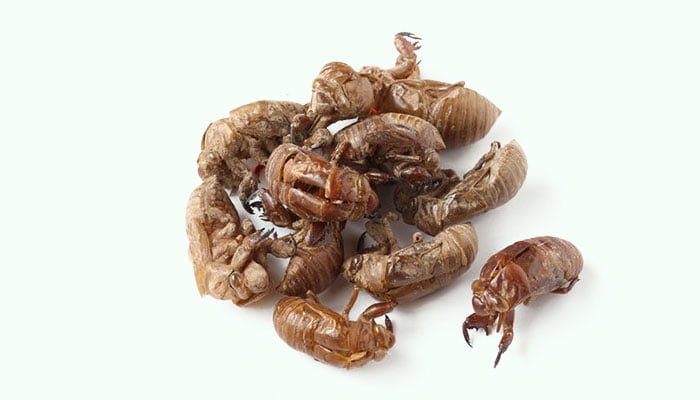What Is Chan Tui
Chan Tui commonly known as Periostracum Cicadae is the cast-off shell of Cryptotympana pustulata Fabricius after eclosion, which is a hemi-winged insect belonging to the family Cicada. It is common animal medicine, which first appeared in <Mingyi Bie Lu> around 420-589 AD.
There are about 2,000 species of cicadas, which are distributed in temperate and tropical regions. Among them, most of the cicadas inhabit grasslands and forests, and only a few inhabit desert areas. They survive by sucking the sap from the roots of plants.
Such insects usually stay in the soil for several years or more than ten years. During eclosion, they climbed up the trunk, grasped the bark, and finished molting.
Cryptotympana pustulata Fabricius mainly inhabit broad-leaved trees, such as poplars, tung trees, elm trees, and various fruit trees. They have high nutritional and medicinal value. In some Asian countries, the custom of eating cicadas still remains.
In summer and autumn every year, people gather the cast-off shells of Cryptotympana pustulata Fabricius after eclosion, remove impurities, dry them in the sun, and make them into Chinese herbal medicines.
Chan Tui contains chitin, protein, alanine, aspartic acid, proline, serine, alanine, threonine, tyrosine, glutamic acid, aminobutyric acid, isoleucine, phenylalanine acid, leucine, valine, ornithine, methionine, some trace elements.
Generally, the yellow-brown, translucent, and shiny Chan Tui is preferred.
According to <Compendium of Materia Medica>, the medicinal nature of Chan Tui is relatively cold, with a sweet taste. It has a certain therapeutic effect on the pathological changes of the lung and liver meridians.
In traditional Chinese medicine, it is often used to dispel wind and heat, relieve sore-throat to restore voice, promote eruptions, improve vision and remove nebula, rest wind and relieve spasm, and treat acute postpartum urinary retention, urticaria, keratitis, pertussis, tetanus, nephritis, epilepsy, aphonia, diabetic nephropathy, malaria, menstrual headache, uterine prolapse, infant diarrhea, laryngogenic cough, facial nerve palsy, anus prolapse, blood in the stool, herpes zostor, hydrocele of tunica vaginalis, pernio, herpangina, convulsions and night crying in children.
There are about 50 kinds of Chinese medicine prescriptions containing it, such as Huang Shi Xiang Sheng Wan, Bo Yun Tui Yi Wan, and Jian Min Yan Hou Pian.
Benefits
- Anti-inflammation, inhibiting xylene-induced ear swelling in mice.
- Raising the pain threshold and reducing the number of writhing in mice induced by acetic acid.
- Reducing serum triglyceride and total cholesterol levels.
- Inhibiting platelet aggregation, reducing the whole blood viscosity and red blood cell aggregation index of hyperlipidemia rats, and preventing thrombosis.
- Blocking the release of histamine, inhibiting allergic reactions and the degree of airway damage, slowing down airway inflammation, and treating bronchial asthma.
- Increasing the white blood cell content, improving the microscopic blood stasis state, and relieving the spasm of the bronchial smooth muscle.
- Dispelling wind and heat, treating fever, aversion to wind, headache, and thirst in the early stage of warm diseases or wind-heat.
- Treating swelling and pain in the throat and hoarse voice caused by wind heat attacking the upper.
- Promoting eruptions, and treating the insufficient outbreak of early measles, and rubella itching.
- Treating redness, swelling, and pian of the eyes, and nebula caused by wind heat attacking the upper or flaming-up of the liver fire.
- Resting wind and relieving spasms, treating convulsions and night crying in children, and teeth clenched, tetany, and opisthotonos caused by tetanus.
- Inhibiting the growth of Ehrlich ascites cancer cells and cervical cancer CJTC-26 cells.
- It cooperates with pentobarbital sodium to prolong the sleep time of experimental mice.
- Its water extract can prolong the incubation period of convulsions in mice, prolong the death time of convulsed mice, and reduce the mortality rate.
- Studies have found that its extract can induce lymphocyte apoptosis after activation in patients with systemic lupus erythematosus. As the concentration of the drug increases and the action time of the drug prolongs, the activation of T lymphocytes increases, and the number of apoptotic cells gradually increases.
Combinations
- It can be used in combination with Bo He (Mentha), Niu Bang Zi (Fructus Arctii), Qian Hu (Radix Peucedani), etc. to treat fever, aversion to wind, headache, and thirst in the early stage of warm diseases or wind-heat.
- It can be used in combination with Bo He (Mentha), Niu Bang Zi (Fructus Arctii), Jin Yin Hua (Flos Lonicerae), and Lian Qiao (Fructus Forsythiae), etc. to treat swelling and pain in the throat and hoarse voice caused by wind heat attacking the upper.
- It can be used in combination with Ma Huang (Ephedra), Niu Bang Zi (Fructus Arctii), and Sheng Ma (Rhizoma Cimicifugae) to treat the insufficient outbreak of early measles.
- It can be used in combination with Jing Jie (Schizonepeta Tenuifolia), Fang Feng (Radix Saposhnikoviae), Ku Shen (Radix Sophorae Flavescentis), etc. to treat the itching caused by rubella.
- It can be used in combination with Ju Hua (Flos Chrysanthemi), Bai Ji Li (Fructus Tribuli), Jue Ming Zi (Cassia Seed), Che Qian Zi (Semen Plantaginis), etc. to treat redness, swelling, and pian of the eyes, and nebula caused by wind heat attacking the upper or flaming-up of the liver fire.
- It can be used in combination with Tian Ma (Rhizoma Gastrodiae), Jiang Can (Bombyx Batryticatus), Quan Xie (Mesobuthus Martensii), Tian Nan Xing (Rhizoma Arisaematis), etc. to treat teeth clenched, tetany, and opisthotonos caused by tetanus.
Side Effects
- At present, there are no reports in the literature that Chan Tui has toxic effects, and there are no reports of serious adverse reactions when it is taken according to the prescribed dose.
- Overdose may cause abdominal pain or fatigue.
Precautions and Warnings
- The dosage of Chan Tui should be controlled at 3-10g.
- It can be made into decoctions or ground for external use.
- People who are allergic to Chan Tui should not take it.
- People with wind-cold should not take it.
- Pregnant women and breastfeeding women should take it under the guidance of a doctor.
